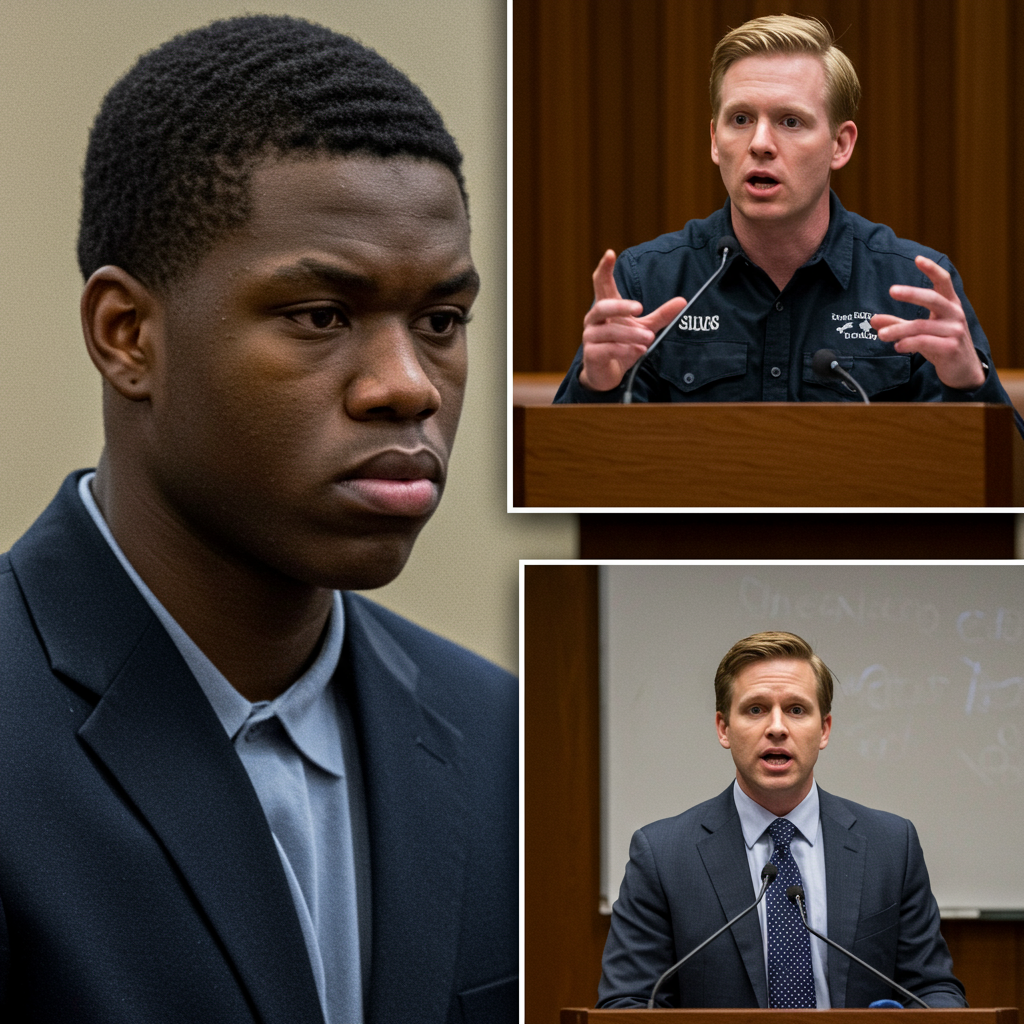A stunning development has emerged in the high-profile 2022 University of Idaho student murders case. Accused suspect Bryan kohberger has formally entered a guilty plea to the charges he faced. This significant and unexpected decision means he avoids a lengthy and intensely scrutinized trial, definitively eliminating the possibility of the death penalty. News of the potential agreement broke on Monday, June 30, 2025, culminating in a formal court session on Wednesday, July 2, 2025. This development comes almost three years after the brutal slayings that deeply impacted the quiet college town of Moscow, Idaho, offering a complex step toward finality in a case that has captured national attention. The outcome leaves the victims’ families navigating a range of profound emotions.
Bryan Kohberger, now 30 years old and formerly a criminology doctoral student, was arrested weeks after the tragic events of November 13, 2022. He had previously maintained his innocence through legal filings. Reports confirm that Kohberger pleaded guilty to all four counts of first-degree murder and an associated burglary charge. This pivotal step bypasses the jury trial originally set for August 2025, ensuring the case does not proceed as initially planned.
Plea Agreement Details Revealed
Sources indicate the terms of the agreement were communicated to the victims’ families in a letter from the Latah County Prosecuting Attorney’s Office. An attorney representing one victim’s family also confirmed these developments to the media. The defense team reportedly initiated the plea deal discussions, seeking an offer from the state. The agreement outlines specific, stringent consequences for Kohberger.
Under the terms accepted by Judge Steven Hippler, Bryan Kohberger will receive four consecutive life sentences in prison without the possibility of parole. This ensures his conviction for the deaths of Ethan Chapin, Xana Kernodle, Madison Mogen, and Kaylee Goncalves. He also faces a 10-year sentence for the related burglary charge, which will run concurrently. A critical element of the deal requires Kohberger to permanently waive all rights to appeal his conviction or sentence. Prosecutors highlighted this provision, explaining it prevents families from potentially facing decades of uncertain legal challenges in post-conviction proceedings. By accepting this agreement, Kohberger successfully avoids a potential death sentence, which prosecutors had initially planned to seek via execution by firing squad in Idaho. Latah County Prosecuting Attorney Bill Thompson emphasized that the plea deal guarantees Kohberger’s conviction and ensures he will spend the rest of his life incarcerated, removing trial risks for the state.
Victim Families Respond with Deeply Varied Emotions
The news of the guilty plea agreement has triggered powerful and significantly varied reactions among the families of the four slain students. While the agreement prevents a potentially lengthy and emotionally draining trial process, it has not brought a unified sense of justice or closure. This Bryan Kohberger plea deal has underscored the profound differences in how loved ones perceive the path toward accountability.
The family of Kaylee Goncalves expressed intense anger and disappointment. They issued statements indicating they were “beyond furious at the State of Idaho” and felt the state had “failed us” by accepting this agreement. They described the development as “very unexpected” and strongly criticized the process. The Goncalves family characterized the outcome as a “secretive deal” and a “hurried effort” made without sufficient consultation on specific terms. They stated that a potential plea was only vaguely mentioned shortly before the formal offer, leaving little time to prepare for the scheduled change of plea hearing. The family had consistently advocated for the death penalty and reportedly conveyed a “HARD NO” when the possibility of a plea was first raised. They continue seeking a full confession from Kohberger, the location of the murder weapon, confirmation that he acted alone, and a complete, truthful account of that tragic night. Kaylee’s father reportedly protested the deal outside the courthouse during the hearing, feeling the four life sentences were akin to “daycare” compared to the finality their daughters faced.
In stark contrast, the family of Ethan Chapin indicated support for the agreement and planned to attend the court hearing. Ben Mogen, Madison Mogen’s father, also expressed relief and support for the plea deal. He viewed it as securing a final, definitive outcome, allowing his family to begin moving forward without the emotional burden of a long trial and potential appeals. He stated that avoiding a potentially quicker death sentence via trial and securing a guaranteed life sentence provided a clearer path toward closure and ensured the perpetrator was punished and the public protected. An attorney for Madison Mogen’s family stated they “100%” supported the outcome, expressing gratitude for the “successful outcome.” The family of Xana Kernodle also reportedly harbored reservations, with one relative expressing a preference for a jury trial, hoping for a delay in any formal decision on accepting the plea to allow for further consideration.
Investigation and Evidence Leading to the Plea
Bryan Kohberger was apprehended in late December 2022 at his parents’ home in Pennsylvania, approximately six weeks after the November 13, 2022, homicides. At the time of the killings, he was enrolled as a Ph.D. student in criminology and worked as a teaching assistant at Washington State University in Pullman, Washington. Pullman is located just a short distance across the state border from Moscow, Idaho. The murders plunged the small town of Moscow, which had not experienced a homicide in about five years, into a state of fear and uncertainty during the initial search for a suspect.
The extensive investigation that ultimately led to Kohberger’s arrest involved significant technological analysis and forensic work. Authorities compiled a substantial case against him over months of tireless effort. Prosecutors had reportedly assembled key evidence and were prepared to present it at trial.
Key pieces of evidence linking Kohberger to the crime scene included several crucial connections:
DNA Evidence: Genetic material matching Kohberger’s profile was discovered on a knife sheath found near one of the victims’ bodies at the crime scene. Investigators considered this ‘touch DNA’ evidence a cornerstone of their case, viewing it as a strong link.
Vehicle Tracking: Law enforcement tracked a white Hyundai Elantra seen repeatedly near the crime scene using security camera footage from the area. This vehicle was positively linked to Kohberger. Surveillance footage reportedly showed the car circling the King Road house before the murders and leaving at high speed afterward, with analysis suggesting the vehicle was in the area near the apartment approximately 23 times before the night of the killings.
Cellphone Data: Analysis of Kohberger’s cellphone pings placed his device in the vicinity of the victims’ off-campus home on numerous occasions in the months leading up to the murders and also on the night they occurred.
Online Purchases: Investigators uncovered online shopping records showing that Kohberger had purchased a military-style knife, a sheath similar to the one found at the scene, and a knife sharpener months before the stabbings. Prosecutors argued these purchases were consistent with the weapon potentially used in the crime, noting alleged attempts by Kohberger to erase this purchase from his Amazon account later.
The defense team had previously filed motions attempting to exclude the DNA evidence, remove the death penalty as a possible sentencing option (citing arguments based on standards of decency, international law, and Kohberger’s autism diagnosis), and argue that “alternate perpetrators” could be responsible for the killings. However, the judge overseeing the case, Steven Hippler, denied these motions, deeming the alternate perpetrator argument speculative and lacking evidence, ruling it “entirely irrelevant” and requiring “rank speculation” by a jury. Recent legal setbacks for the defense, including failed attempts to exclude evidence and the judge’s ruling requiring distant defense witnesses to travel to Idaho, may have contributed to the decision to pursue a guilty plea.
Understanding the Rationale Behind the Plea Agreement
While the precise motivations driving the Bryan Kohberger plea deal are not entirely public, such agreements frequently emerge when both the prosecution and defense perceive potential advantages. From the prosecution’s perspective, a plea guarantees a conviction and secures a sentence of life in prison. This outcome avoids the inherent uncertainties, considerable expense, and potentially decades-long appeals process associated with a death penalty trial. Accepting a plea provides a degree of finality for the justice system. For some victim families, it can offer a quicker resolution than waiting through years of potential legal challenges. Prosecutors also noted that the deal spares families the “uncertainty of decades of post-conviction appeals,” ensuring a definitive outcome.
From the defense perspective, accepting a sentence of life imprisonment without the possibility of parole represents the highest certainty alternative to the significant risk of receiving a death sentence following a trial. The defense team reportedly requested the plea deal, indicating Kohberger’s decision to accept the guaranteed life sentence rather than face the potential of capital punishment. Waiving appeal rights as part of the agreement solidifies this outcome, preventing any future attempts to overturn the conviction or sentence.
What Comes Next: Formal Sentencing Hearing
A formal court hearing occurred on Wednesday, July 2, 2025, at the Ada County Courthouse in Boise, Idaho. The case venue had previously been moved to Boise from rural northern Idaho due to extensive pretrial publicity that could potentially impact jury impartiality in the region where the crimes occurred. At this hearing, Kohberger formally entered his guilty plea before Judge Steven Hippler. During the hearing, Kohberger responded to questions about his understanding of the proceedings with single-word answers and signed a document admitting to entering the home with intent to kill. He reportedly remained impassive throughout.
Judge Hippler explicitly addressed the numerous messages sent to the court and his staff regarding the case during the hearing, calling them “extraordinarily disruptive.” He emphasized that the court does not, and will never, take public sentiment into account when making judicial decisions. He also clarified that, as a judge, he cannot require a prosecutor to seek the death penalty if they choose not to.
If Judge Hippler accepts the terms of the plea agreement as expected, a sentencing hearing is anticipated to be set for late July 2025. Formal sentencing is currently scheduled for July 23, 2025. Victims’ families will have the opportunity to make statements during this hearing, a key moment for those affected by the tragedy. The judge’s decision on whether to approve the deal is based on legal principles and facts presented, not public opinion or the strong emotions surrounding this case.
Frequently Asked Questions
What are the specific terms of the Bryan Kohberger plea agreement?
Bryan Kohberger pleaded guilty to four counts of first-degree murder and one count of burglary in connection with the November 2022 Idaho student stabbings. As part of this plea agreement, the prosecution removed the death penalty as a sentencing option. Instead, Kohberger will receive four consecutive life sentences in prison without the possibility of parole for the murders, plus a 10-year sentence for burglary. He also permanently waives all rights to appeal his conviction or sentence.
What evidence linked Bryan Kohberger to the Idaho murders case?
Investigators connected Bryan Kohberger to the crime scene through key evidence. The most significant was DNA evidence found on a knife sheath at the victims’ home, which matched his genetic profile. Authorities also used cellphone data and security camera footage to track a white Hyundai Elantra linked to Kohberger, showing his presence in the neighborhood multiple times before and during the murders. Additionally, investigators found online purchase records showing he bought a military-style knife and sheath similar to the one found at the scene months earlier.
How did the victims’ families react to the Bryan Kohberger guilty plea agreement?
Reactions from the victims’ families were deeply varied. The family of Kaylee Goncalves expressed profound anger and disappointment, feeling “failed” by the state for agreeing to the plea and removing the death penalty option. They felt the process lacked sufficient family input and continued to seek a full confession and more details. In contrast, the family of Ethan Chapin supported the agreement, and the father of Madison Mogen expressed relief. They felt the plea avoids a prolonged, emotionally draining trial and provides a clear path toward closure by guaranteeing a conviction and life sentence, ensuring the perpetrator remains incarcerated forever. The family of Xana Kernodle also reportedly had reservations.
Conclusion: A Step Toward Resolution, Marked by Division
Bryan Kohberger’s acceptance of a guilty plea represents a significant and complex moment in the tragic Idaho student murder case. While it guarantees a conviction and secures a life sentence, potentially offering some degree of finality for the community and closure for certain families, it also starkly highlights the deep divisions among the victims’ loved ones regarding how justice should be pursued. The formal entry of the plea on July 2, 2025, and the upcoming sentencing hearing scheduled for late July 2025 will be the next steps in this emotionally charged legal saga. The case continues to resonate nationwide, serving as a reminder of the profound impact of violent crime and the challenging paths victims’ families must navigate within the justice system, where achieving universally agreed-upon justice is often difficult. This plea deal has provided a legal resolution but leaves many questions unanswered for those most affected.



